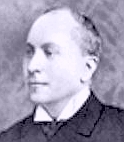On this occasion I gave him another dose of the ornith. umbel. The effect of it, however, was to confirm my belief that this swelling of the absorbents, shown by the condition of the right leg and previous swollen condition of the feet and ankles, resulted from the high pressure put upon the emunctories owing to the setting free of poison in the system.
Subsequently, in a few days, he came in to me in a great fright, and pulling up his trousers showed me the terrible condition, as he thought, of his legs. They were swollen, and great red streaks and patches could be seen coursing down the limbs.
Believing that this was due to the rapid elimination of the cancer poison, I rather astonished him by insisting upon his walking away without any medicine whatever.
Since then, his recovery has gone on uninterruptedly, and though since this last report he has taken two or three doses of the ornithog. umb., he has not had any other medicine (if I except a unit dose of Alliaria officinalis), and is now in the state of health set forth in this letter received from him:
“Elm Lodge, Feltham, Middlesex. “May 3, 1899.
“Dr. Cooper. “DEAR SIR, In addition to my previous letters to you, I must tell you I have had no pain since the first week in August last; I certainly feel a slight weakness in the stomach at times, but not always.
“My appetite is wonderfully good, and I can eat almost any kind of food, and am also able to enjoy my meals, which I had not done for many years; am also to get about well, and carry on my business without fatigue.
“I have rejoined the Volunteer force and have done tow or three good stiff marches, besides firing in competitions, and feel no ill effects. I have never felt so well for nearly twenty years. I feel wonderfully well know, and have a gained the two stone odd which I lost during my illness. Everyone I meet, whether in Kensington, Shepherd’s Bush, or Feltham, is astonished when they see me, and all speak of the marvellous cure effected by yourself. “I am, dear Sir, ” Yours faithfully, “GEO. A. MURRELL.”
Evidence could not stronger in favour of my assertion that these internal cancers are most amenable to treatment; of all the forms of chronic complaints there is no other that so surely deprives the patient of life and in which life can be with such certainty restored by the influence of simple remedies.
This is the lesson of Murrell’s case, and his very existence on earth is an undeniable testimony to its import.
In November, 1899, he was examined by a doctor in Brentford for Life Insurance, and notwithstanding the fact of his having been operated upon so recently in the Cancer Hospital, this doctor pronounced him to be absolutely free from diagnosable diseases, and recommended him for acceptance at ordinary rates of premium; that is, in about fifteen months after I had taken him up in a dying state, he is declared by an opinion in no way friendly, to be healthy. Since writing above June 1900 Murrell has had some return of pain; this in no way alters arguments of text.

